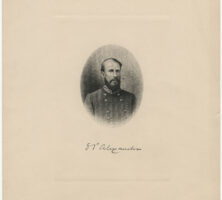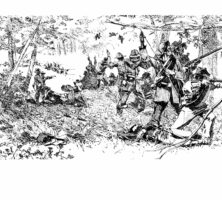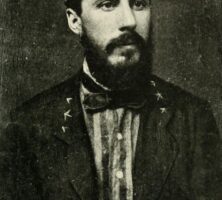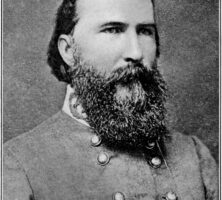Edward Porter Alexander served in twelve major battles and campaigns of the eastern theater of the Civil War (1861-65). He rose to the rank of brigadier general during the war, and afterward he became a scholar, a businessman, and a writer.
The sixth of eight children, Alexander was born on May 26, 1835, in Wilkes County to Sarah and Adam Alexander. He received a well-rounded education and entered the U.S. Military Academy at West Point, New York, in 1853. He graduated third in his class and was commissioned as an engineer in the U.S. Army. After participating in an aborted military expedition to wrest Utah from Brigham Young, Alexander returned to West Point to teach. He met and married Bettie Mason in 1860, and they eventually had three sons and two daughters. He was restationed in Washington Territory, where he learned that Georgia had seceded from the Union. He resigned his Federal commission and returned home.

Courtesy of Hargrett Rare Book and Manuscript Library, University of Georgia Libraries.
As a Confederate captain, Alexander was first charged by Jefferson Davis to establish the Confederate States Signal Corps, a task that he performed well and that elevated his status among the officers. At the First Battle of Manassas in Virginia, in the service of General P.G.T. Beauregard, he used a telescope, a gift from a friend, in a signal tower to spot Union movements and signal them to officers on the battlefield below. In the Seven Days’ encounters outside the Confederate capital of Richmond, Virginia, he became the only Confederate officer to reconnoiter from a balloon.
In 1861 he was appointed chief of ordnance for the Army of Northern Virginia. The next year he was made an artillery battalion commander under Lieutenant General James Longstreet, and his strategic placement of artillery helped the Confederates win at Fredericksburg. In 1863 Alexander fought at Chancellorsville, and though he was instrumental in effecting Pickett’s charge at Gettysburg, Pennsylvania, he is famous for his exchange of notes with Longstreet before the doomed charge about who would actually order it. He followed Longstreet’s corps to Chickamauga in northwest Georgia, and he was made chief of artillery during the Knoxville, Tennessee, campaign. In 1864 he was wounded at Petersburg, Virginia, but recovered. After his promotion to brigadier general in February 1864, he commanded Longstreet’s artillery as the Confederates retreated and then surrendered to the Union.

After the war Alexander taught civil and military engineering and mathematics at the University of South Carolina. He resigned his position in 1869 to become president of the Columbia Oil Company, a firm that sought to produce and market cottonseed oil. When this undertaking failed, he accepted the position of superintendent of the Columbia and Augusta Railroad in 1871. The next year Alexander was named president of the Savannah and Memphis Railroad. In 1883 he was appointed to the Capital Commission of the State of Georgia, and he served until 1888. On the basis of his business experiences he wrote Railway Practice (1887). He was appointed by U.S. president Grover Cleveland in 1897 to resolve border disputes between Nicaragua and Costa Rica, and during his two-year stay in Central America he wrote Military Memoirs of a Confederate, which was published in 1907. Alexander died on April 28, 1910, in Savannah.












